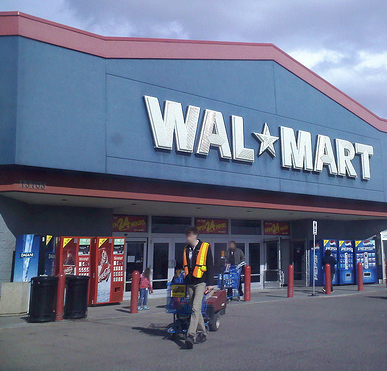Wal-mart is often on the cutting edge of sales, working to streamline and somehow wring a few more pennies out of each sale. And for good reason, with 200 million customers a week, a penny per customer multiplies to 2 million dollars a week or over $100 million a year. In today’s post, Keith Fitz-Gerald, Chief Investment Strategist for Money Map Press tells us how Wal-mart is working with American Express to implement a new hybrid type of card that could create massive changes in the financial world. ~ Tim McMahon, editor
Is Wal-Mart’s Bluebird Brilliant… or an Invitation to the Slippery Slope?
Don’t look now, but Wal-Mart is getting into the banking business.

Bluebird customers can access their money for free using one of more than 22,000 ATMs, or simply be charged $2 if they are not part of a direct deposit program.
Is Bluebird too good to be true?
Yes and no.
On one hand, I think this is a brilliant alliance of two very different partners. Wal-Mart is obviously critical to mainstream America, so moving up the ladder to American Express gives them increased “oomph” and brand projection.
It also allows the Bentonville, AR-based behemoth to tie up with a stable financial provider that’s relatively unscathed by the financial crisis.
With regard to Amex, somebody in New York had a brilliant brain cramp when they hatched this union.
The company has always wanted to move into middle America but has been hamstrung on a variety of levels.
The Bluebird accounts give American Express unprecedented marketing reach into an entirely new customer profile while bypassing the traditional competitive credit card channels. At the same time, it also offers an entirely new source of capital.
While there are a good many details yet to be disclosed, I fully expect the Bluebird to be a win for consumers.
Not only is it going to create an entirely new class of “bank” but it potentially end runs the iron- fisted grip traditional financial institutions have had on consumers while also reducing the risks associated with credit markets. You can bet banking lobbyists will hate it.
Why Banks Already Hate Bluebird
And that brings me to the “no” part.
When you use a credit or debit card at Wal-Mart, Wal-Mart’s bank has to pay the customer’s bank something called an “interchange fee.”
The pricing structure is complicated and expensive. Credit card interchange fees can vary significantly by region, card type and whether or not the transaction is conducted online or in person. They’re usually a few percent of the overall transaction value plus some sort of predetermined base.
Larger merchants like Wal-Mart negotiate better rates but still have very little control over credit card rates, which average about 2%. U.S. credit card issuers have held the upper hand for years and it’s estimated that they bank more than $30 billion a year from interchange fees alone.
When you use a traditional debit card at Wal-Mart to buy things, Wal-Mart still has to fork over an interchange fee only. Thanks to last year’s Durbin Amendment, it’s limited to $0.21 per transaction.
That means Wal-Mart gets to keep more money every time a customer swipes a debit card and banks have lost billions in interchange revenue.
Here’s where the rubber meets the road.
Wal-Mart serves over 200 million customers worldwide a week. If those customers buy $25 per transaction using credit cards, the company forks over $0.50 per transaction or $100 million a week in interchange fees (calculated hypothetically using the 2% industry standards credit card fee).
If those same customers pay by debit card, Wal-Mart only has to hand over $42 million a week in interchange fees, which means that Wal-Mart saves $58 million it no longer has to hand over to the cards and card networks.
But if customers use the new “Bluebird” cards, there are no interchange fees, which means potentially that Wal-Mart gets to keep even more money for itself, further depriving the big banks of both their leverage and “their” cash.
That’s because American Express charges something it calls a “merchant discount rate,” which is really an interchange fee under the guise of a “prepaid discount” by any other name.
Functionally speaking, this makes the Bluebird accounts the same as a traveler’s check which is, in turn, really a form of pre-paid credit card.
And what’s wrong with that?…
Here’s Where it Gets Slippery

As I understand the details so far, the Bluebird completely bypasses the Durbin Amendment to the Dodd-Frank Act. Specifically, the consumer protection provisions in it related to restrictions on fees that banks and card networks can charge for the privilege of using traditional credit and debit cards.
So once again we have two major corporations that have teamed up ostensibly for the purpose of helping low- income consumers but are doing so in such a way that avoids laws that Congress has passed with the intention of regulating financial products and services.
To be clear, I am not suggesting that either Wal-Mart or American Express has any bad intentions.
Just that the potential for malfeasance is there because our regulators once again left a loophole the size of a Texas barn door in place.
Almost every problem we are dealing with today as part of the financial crisis ties, in some way shape or form, to institutions that played either outside the law or on the fringes of existing regulation.
Under the circumstances, I can only wonder who’s going to follow American Express through the door Bluebird has opened. Apple? Home Depot? An instant paycheck cash chain?
And what it’s actually going to take to regulate a “bank” that sells everything from air-cleaners to vegetables.
Best Regards,
Keith Fitz-Gerald, Chief Investment Strategist, Money Morning
Reprinted By Permission of Money Morning
Original Article: Is Wal-Mart’s Bluebird Brilliant or an Invitation to the Slippery Slope?
Photo Credits: By galaygobi and markyeg
